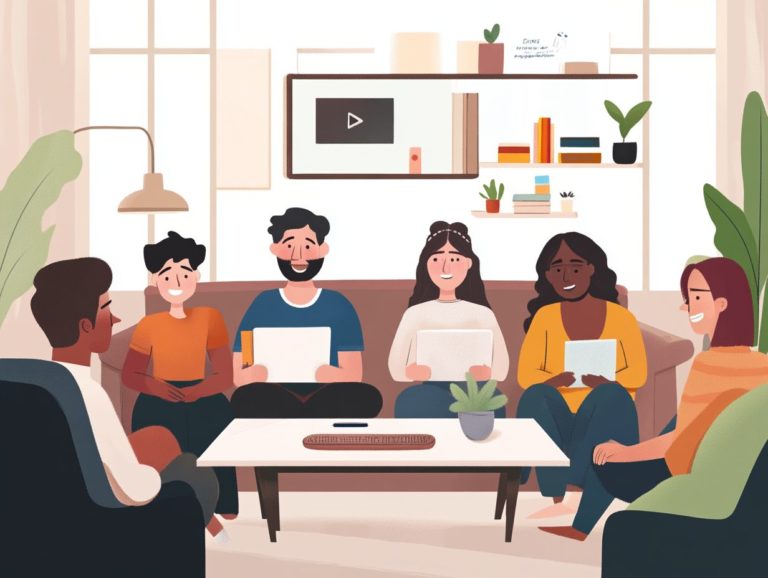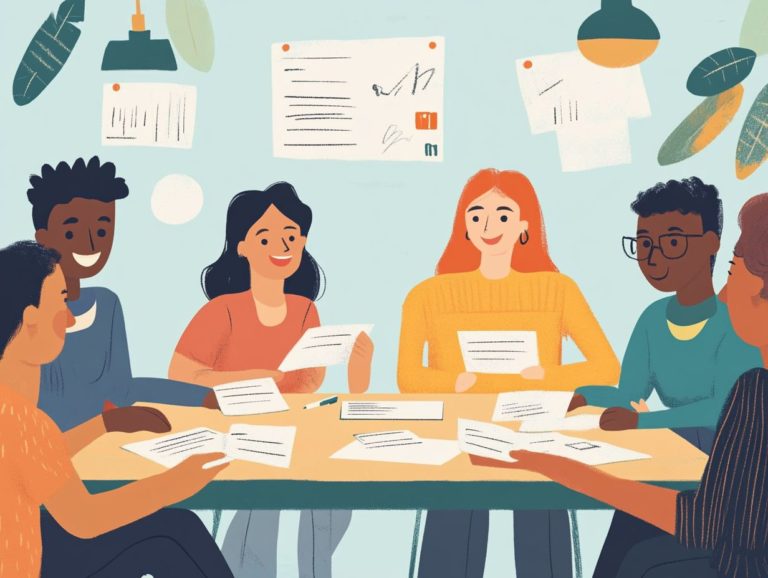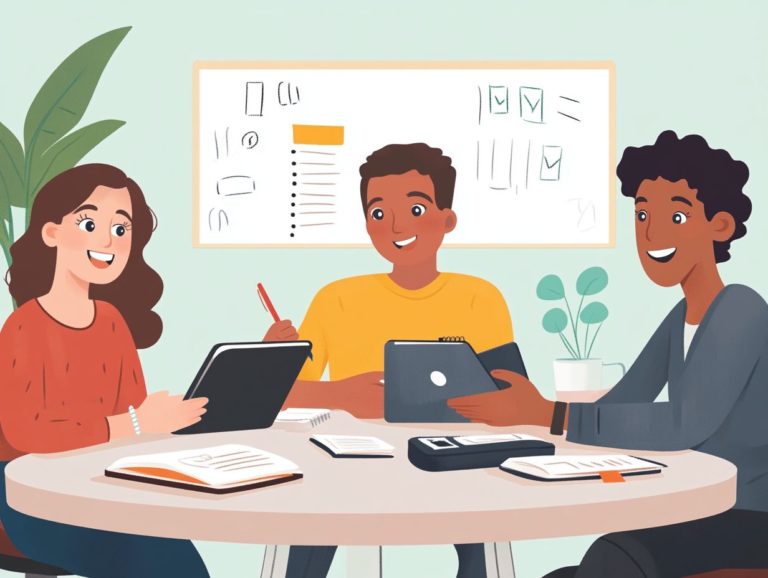5 Essential Tips for Traveling Language Learners
Traveling stands as one of the most immersive and effective avenues for learning a new language. Whether you find yourself wandering the enchanting streets of Paris or exploring the bustling markets of Tokyo, each experience presents a unique opportunity to practice and refine your language skills.
Here are five essential tips to supercharge your language learning while traveling!
Get ready to turn your travels into an exciting language adventure!
Contents
- Key Takeaways:
- 1. Immerse Yourself in the Culture
- 2. Practice Speaking with Locals
- 3. Use Language Learning Apps and Resources
- 4. Keep a Travel Journal in the Language
- 5. Attend Language Exchange Events
- Why Is Traveling Beneficial for Language Learning?
- How Can One Make the Most of Their Language Learning Travel Experience?
- What Are the Common Challenges for Language Learning Travelers?
- How Can One Prepare for Language Learning Travel?
- What Are the Benefits of Combining Travel and Language Learning?
- Frequently Asked Questions
- What are the 5 essential tips for traveling language learners?
- How can I immerse myself in the culture while traveling?
- What are some ways to practice with locals?
- How important is it to set achievable language goals while traveling?
- Are language learning apps effective for traveling language learners?
- How should I approach making mistakes while learning a language while traveling?
Key Takeaways:
- Immerse yourself in the culture to truly understand the language.
- Practice speaking with locals to boost your confidence.
- Use language learning apps to enhance your studies while traveling.
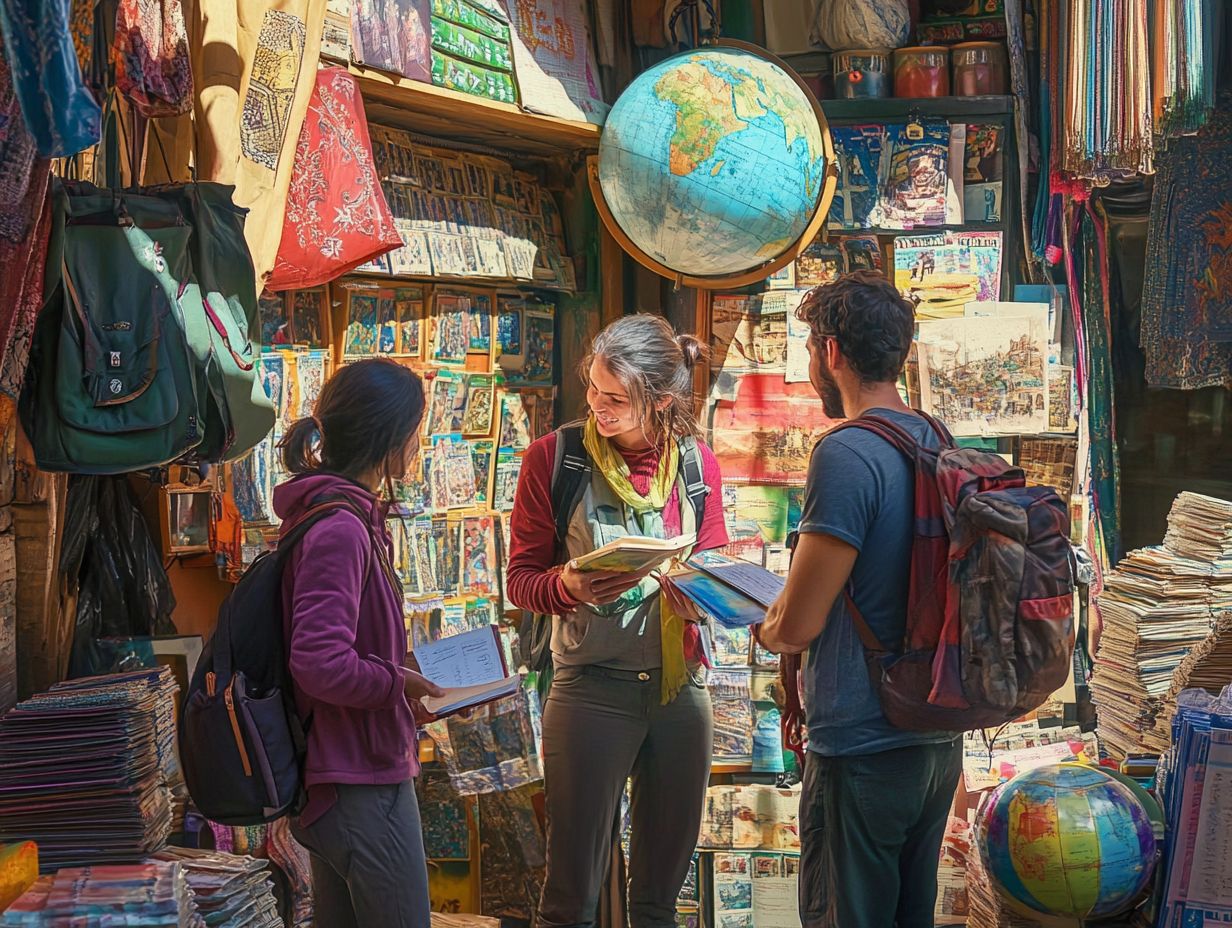
1. Immerse Yourself in the Culture
Immersing yourself in the culture of your target language is crucial for your learning journey. It enhances your understanding and appreciation of the subtle nuances that shape communication.
This is especially important when traveling to countries like Italy, where cultural context is key to effective dialogue. By embracing local traditions and social interactions, you unlock deeper insights that transcend mere vocabulary.
Here s how you can get started:
- Watch foreign films; they expose you to authentic dialogue while conveying cultural subtleties through visual storytelling.
- Engage with locals casual conversations and community events provide invaluable real-life experiences that enhance your language proficiency.
- Participate in cultural festivals for immersive environments where you can practice your language skills in a dynamic context.
2. Practice Speaking with Locals
Practicing your speaking skills with native speakers boosts your confidence and enhances your pronunciation. It helps you understand local slang, making conversations feel more natural and enjoyable.
To elevate these interactions, explore language exchange apps like HelloTalk to connect with locals eager to practice different languages. This creates a mutually beneficial learning environment.
Joining clubs based on shared interests whether it s sports, art, or hobbies opens doors to meaningful dialogue with community members.
Participating in local events, such as festivals or workshops, helps you practice essential phrases while fostering a sense of belonging, enriching your overall experience in a new culture.
3. Use Language Learning Apps and Resources
Utilizing language learning apps like Duolingo, Babbel, or Rosetta Stone can significantly elevate your study routine. These platforms offer structured lessons paired with interactive tools, making vocabulary and grammar mastery engaging.
These apps provide a diverse range of exercises that adapt to your progress, allowing you to focus on areas needing improvement.
If you re a visual learner, you ll appreciate the graphic-rich content in Rosetta Stone. Conversely, if you learn best through listening, Babbel’s auditory exercises will resonate with you.
To seamlessly integrate these resources into your daily practice, carve out specific time slots for using the apps. Pair this with real-world exercises, such as chatting with native speakers online or journaling in your target language, to reinforce vocabulary in a natural and organic way.
4. Keep a Travel Journal in the Language

Maintaining a travel journal in your target language is an excellent way to hone your writing skills and review new vocabulary. This practice also allows you to reflect on your travel experiences while enhancing your comprehension of the language.
By documenting your daily adventures, you can describe interactions with locals and capture cultural nuances. This also gives you a platform to share your personal insights.
Writing regularly helps expand your vocabulary and incorporate essential phrases that arise in real-life contexts. This makes your learning process more effective.
Reviewing these entries reveals your progress over time. You will notice how much more eloquently you express your thoughts and how your familiarity with the language deepens.
This practice enriches your language skills and helps you connect more deeply with your experiences.
5. Attend Language Exchange Events
Attending language exchange events is a great opportunity to improve your speaking skills in a vibrant social setting. Here, you’ll engage in real-time conversations with both native speakers and fellow learners, greatly improving your language skills.
You can often find these gatherings at local community centers, universities, or even through online platforms. This allows you to connect with individuals from diverse backgrounds.
Immersing yourself in such environments sharpens your linguistic abilities and nurtures cultural understanding while fostering friendships.
To make the most of these exchanges, consider initiating conversations with open-ended questions. Prompts like:
- “What s your favorite traditional dish?”
- “How do you celebrate holidays in your culture?”
These can spark lively discussions. Embracing humor and sharing personal anecdotes will create a relaxed atmosphere, ensuring the experience is enjoyable and productive for everyone involved.
Why Is Traveling Beneficial for Language Learning?
Traveling offers unique advantages for learning a language. It immerses you in experiences that enhance your understanding and practical usage of the language. However, it’s important to be aware of 5 things to avoid when learning a new language. This journey bridges gaps in vocabulary and grammar, helping you navigate language barriers through real-life interactions and cultural insights.
Engaging with native speakers allows you to practice essential phrases in authentic contexts, making your exchanges dynamic and meaningful. Understanding local customs adds depth, letting you learn words while grasping their subtleties.
For instance, greeting someone can vary significantly among cultures. Recognizing these nuances enables you to form deeper connections and have smoother conversations.
Such experiences reinforce your language learning, as you actively apply vocabulary and phrases with figurative meanings. This reshapes your confidence and fluency.
What Are the Best Destinations for Language Learning Travel?
Selecting the right destination is essential for your language-learning journey. Certain locations offer richer cultural insights and immersive experiences that elevate your practice and understanding of the language, much like the 5 fun ways to engage with language learning.
Take Italy, for example. It’s famous not only for its stunning landscapes and historical landmarks but also as a vibrant hub where you can dive into local traditions, savor exquisite cuisine, and explore diverse dialects.
Whether you’re wandering the bustling streets of Rome or drifting along the serene canals of Venice, you ll find ample opportunities to engage with native speakers in everyday situations, making it easier to pick up on subtle nuances.
Spain is another dynamic option. From the flamenco rhythms of Andalusia to the artistic vibrancy of Barcelona, each region presents unique dialects and cultural expressions. This diversity makes these countries prime destinations for anyone eager to enhance their linguistic skills while enjoying their cultures.
How Can One Make the Most of Their Language Learning Travel Experience?

Dive into the local culture; it s the best way to enhance your language learning experience. Immerse yourself in customs, make meaningful connections, and practice speaking and listening in real-life settings.
Join local tours that provide rich cultural backgrounds and opportunities for conversations with guides and fellow travelers in your target language.
Eating at local restaurants helps you enjoy local food and start conversations with locals. This will boost your language skills.
Using travel apps can change the game for you, helping navigate language barriers and regional norms. This makes interactions smoother and deepens your understanding of the community.
By consistently applying these strategies, you’ll enrich your travel experience.
What Are the Common Challenges for Language Learning Travelers?
Language-learning travelers often face challenges that can hinder confidence and progress, such as language barriers and cultural misunderstandings. Utilizing essential tools for language learners can help overcome these obstacles.
These obstacles can appear in different ways, like struggling with local accents or feeling lost due to miscommunications. Embracing these moments can transform them into invaluable learning opportunities.
Practice speaking in low-pressure environments, such as cozy cafes or local markets, where informal conversations can help build your confidence.
Joining local language exchange groups can create connections and ease anxiety. For those looking to enhance their learning, exploring 5 ways to improve your language skills quickly can be beneficial. Cultivating a positive mindset allows you to see mistakes as essential lessons, enriching your travel experiences.
How Can One Prepare for Language Learning Travel?
Proper preparation is key to successful interactions during your language-learning travel. Familiarizing yourself with key phrases and local customs, along with following essential vocabulary tips, makes a significant difference.
Prioritize learning basic phrases for day-to-day communication, and consider exploring unique language learning techniques to ensure a more enjoyable experience as you navigate your surroundings.
Flashcards can effectively build your vocabulary, reinforcing memory through repetition. Researching local customs helps avoid faux pas and fosters deeper connections.
Plan interactions with locals, whether through organized events or casual encounters, to enrich your travel experience and create lasting memories.
What Are the Benefits of Combining Travel and Language Learning?
Combining travel with language learning opens up a wealth of benefits. You gain immersive experiences that deepen your understanding and create lasting memories through meaningful interactions, especially when you use 5 useful phrases for traveling abroad.
This combination not only enhances vocabulary retention but also boosts your conversational skills. For example, chatting with locals in a cozy caf allows the language to flow more naturally as you pick up unique expressions.
Research shows that direct engagement with native speakers leads to much higher retention rates than traditional classroom methods. Many recount how their appreciation for local traditions blossoms, transforming simple trips into rich cultural exchanges.
Such experiences forge profound connections, nurturing a genuine understanding of the people and places you encounter.
Frequently Asked Questions
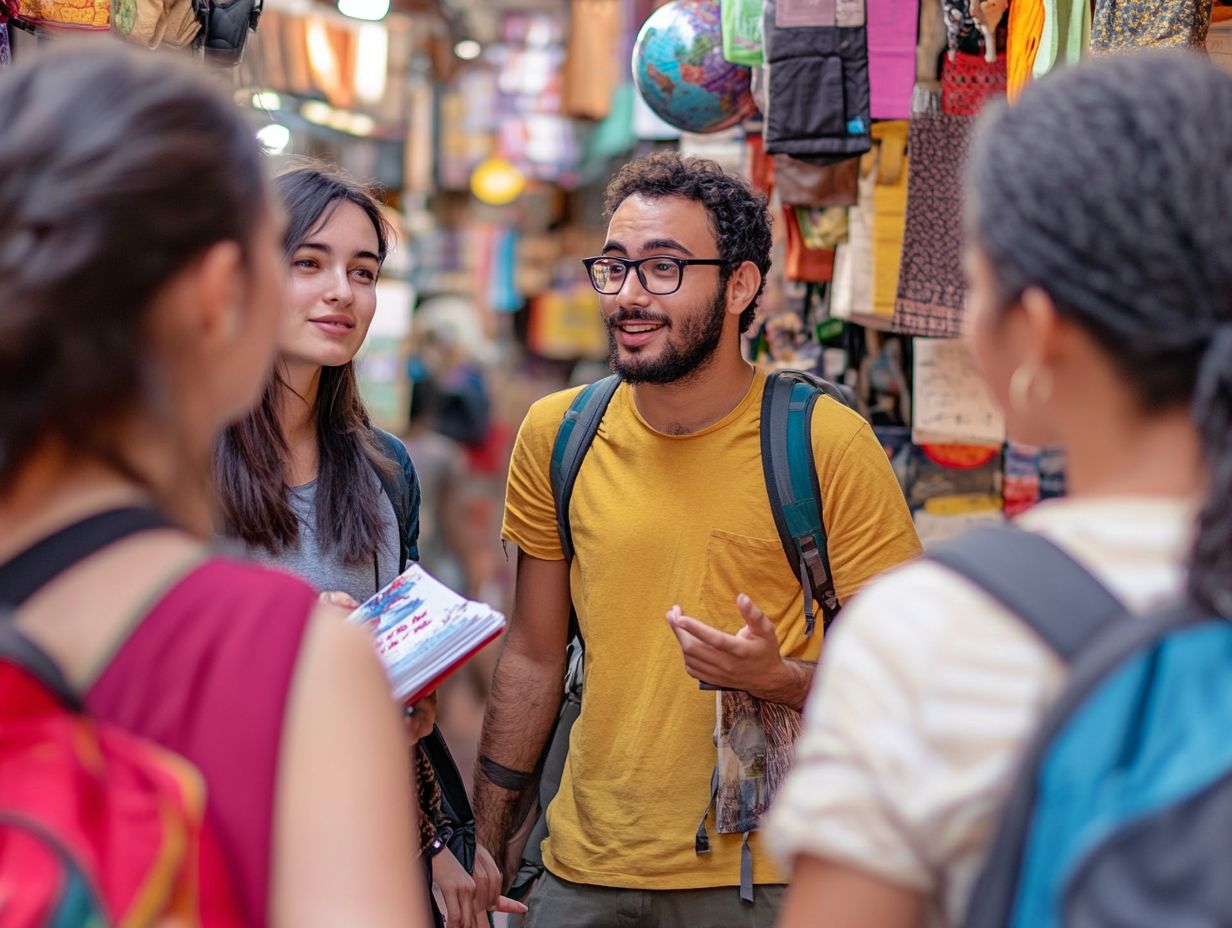
What are the 5 essential tips for traveling language learners?
Here are five essential tips for travelers learning a language. Immerse yourself in the culture, practice with locals, set realistic goals, use learning apps, and embrace your mistakes.
How can I immerse myself in the culture while traveling?
To immerse yourself in the culture, stay with a host family, attend events, try local food, and explore the city like a local.
What are some ways to practice with locals?
Strike up conversations, join language meetups, take a class, or find a language partner online.
How important is it to set achievable language goals while traveling?
Setting realistic goals is crucial for your progress. It keeps you motivated and helps you track your growth.
Are language learning apps effective for traveling language learners?
Yes, language learning apps are highly effective. They allow you to practice on-the-go and offer conversation practice, grammar drills, and vocabulary exercises.
How should I approach making mistakes while learning a language while traveling?
Be open to making mistakes! Each one is a learning opportunity. Locals will appreciate your effort and help you improve.




